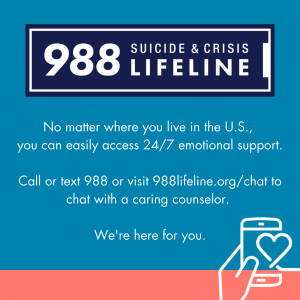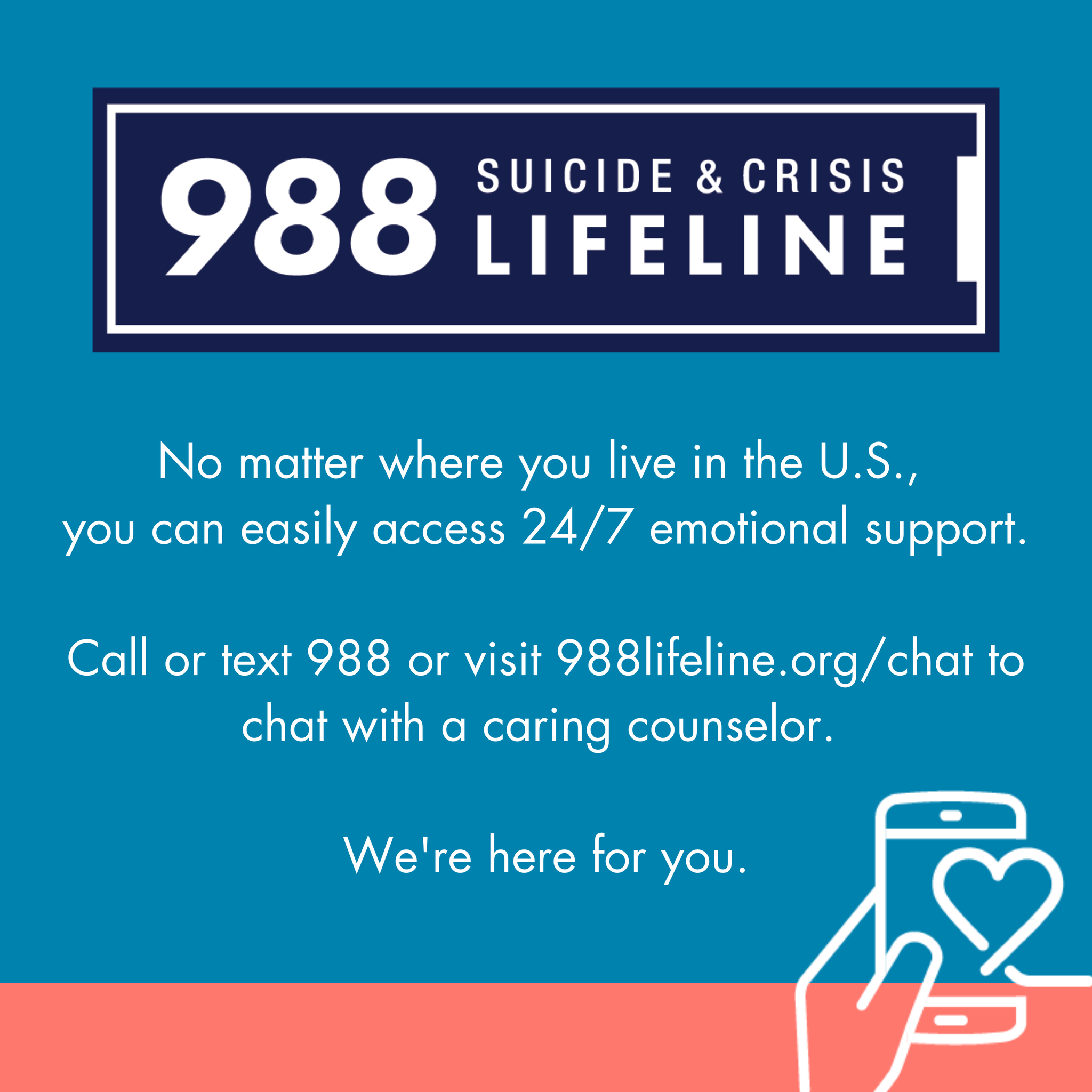New, easy-to-remember number that starts Saturday will connect people in need of behavioral health crisis support
Starting Saturday, July 16, people in Oregon and nationwide who are experiencing a behavioral health crisis will be able to call, text or chat 988 to get compassionate care and support from trained crisis counselors. The new three-digit 988 number will be available 24 hours a day, 7 days a week.
The 988 Suicide and Crisis Lifeline was established to improve access to crisis services in a way that meets our country’s growing suicide and mental health-related crisis care needs.
The 988 number is easy to remember, like 911. 988 will be available to help people who are experiencing a range of behavioral health crises, including: thoughts of suicide or self-harm, substance use, or any other kind of behavioral health crisis.
People can also dial 988 if they are worried about a loved one who may need crisis support.
“Too many people in Oregon don’t have easy, quick access to the support and care they need when facing a mental health crisis,” said Oregon Health Authority Director Patrick Allen. “While fully implementing a transformative crisis care system will take time and further investments, the launch of 988 is a sound first step to connect more people in need with critical, life-saving care.”
The 988 dialing code connects callers to the existing National Suicide Prevention Lifeline; a network of local crisis call centers throughout the country. In Oregon, 988 call centers are operated by Lines for Life statewide, and Northwest Human Services in Marion and Polk counties.
“988 is going to transform the way we support people in crisis,” said Lines for Life CEO Dwight Holton. “It will take time to build, but 988 will deliver hope to people in crisis as well as their families, loved ones and communities.”

How 988 works to help people in crisis
988 call services will be available in English and Spanish, along with interpretation services in more than 150 languages. Texting 988 and online chat (available at http://988lifeline.org/) are currently available only in English.
According to the National Suicide Prevention Lifeline, counselors resolve more than 95 percent of calls over the phone. The crisis counselors are trained to use the least invasive interventions and are linked to a network of services. Often, a supportive conversation is all that is needed to help someone in crisis. When in-person support or intervention is needed, counselors may dispatch a mobile crisis team or first responder.
Preparing for 988 calls
In 2020, the National Suicide Prevention Lifeline received nearly 2.4 million calls, and call volume is anticipated to significantly increase with the launch of 988.
The Oregon Legislature, through House Bill 2417 (2021) and other transformative investments, is strengthening and expanding the state’s behavioral health crisis system. This includes approximately $7 million for staffing Oregon’s two 988 call centers and approximately $39 million allocated to Community Mental Health Programs to enhance and expand community-based mobile crisis intervention services.
In Oregon, Lines for Life has staff who can provide culturally and linguistically specific services around the clock and Northwest Human Services has expanded its staff to do the same. As the 988 crisis response system expands, additional funding will be required to sustain the call centers, response units and other services.
Community input is designing the future of 988
OHA is working with communities with lived experience in the behavioral health system to guide the design, implementation and policies of 988 and a broader crisis response system, especially through the Crisis System Advisory Workgroup (CSAW). OHA recognizes that many individuals and families with lived experience and from disproportionately affected communities have experienced adverse impacts of the crisis response system due to systemic and historical social injustice.
With community partnerships and insights, OHA hopes that 988 can provide an empowering, culturally responsive experience for individuals in crisis and that the system will meet the unique needs of groups disproportionately impacted by health inequities, including youth, rural populations, communities of color, veterans and people in the military, Tribal communities and people who identify as LGBTQIA2S+.
While 988 is the first step, OHA continues to work with partners to develop a crisis response system that will help divert people from emergency rooms and connect people to other community-based behavioral health treatment facilities, such as the Behavioral Health Resource Networks, funded by Measure 110 dollars.
What do people need to know about calling 988?
Important facts to know:
- 988 will be available through every landline, cell phone and voice-over internet device in the United States, as well as text and chat.
- The current technology for 988 will route callers by area code, not geolocation.
- 988 is not currently available when phones are locked or do not have prepaid minutes.
- The transition to 988 will not impact the availability of crisis services for veterans and military service members. They can call 988 and press 1 to connect with the Veterans Crisis Line.
- For support in Spanish, callers can press 2 to connect with the Red Nacional de Prevención del Suicidio.
The 988 Suicide and Crisis Lifeline has an infographic with more information on what happens when people call, text or chat.
Learn more about 988 in Oregon on OHA’s 988 webpage.


